Class Struggle Unionism
$17.95
An essential primer for rebuilding a militant labor movement centered on solidarity with all workers
In stock
Description
By Joe Burns
Haymarket Books
For those who want to build a fighting labor movement, there are many questions to answer. How to relate to the union establishment which often does not want to fight? Whether to work in the rank and file of unions or staff jobs? How much to prioritize broader class demands versus shop floor struggle? How to relate to foundation-funded worker centers and alternative union efforts? And most critically, how can we revive militancy and union power in the face of corporate power and a legal system set up against us?
Class struggle unionism is the belief that our union struggle exists within a larger struggle between an exploiting billionaire class and the working class which actually produces the goods and services in society. Class struggle unionism looks at the employment transaction as inherently exploitative. While workers create all wealth in society, the outcome of the wage employment transaction is to separate workers from that wealth and create the billionaire class. From that simple proposition flows a powerful and radical form of unionism. Historically, class struggle unionists placed their workplace fights squarely within this larger fight between workers and the owning class. Viewing unionism in this way produces a particular type of unionism which both fights for broader class issues but is also rooted in workplace-based militancy.
Drawing on years of labor activism and study of labor tradition Joe Burns outlines the key set of ideas common to class struggle unionism and shows how these ideas can create a more militant, democratic and fighting labor movement.
Read FW Roger Williams’ Industrial Worker review of Class Struggle Unionism here and the Industrial Worker interview with author Joe Burns here!
“Class struggle unionism is responsible for some of the brightest moments in labor history. It motivated the Industrial Workers of the World in their brand of revolutionary unionism, which contributed to some of the greatest strikes in US history.”—Joe Burns, author, from the Introduction
“How can we rekindle widespread working class militancy? And what should such militancy seek to achieve? In Class Struggle Unionism, Joe Burns makes the case that a combative, cohesive, and effective labor movement requires class-conscious unions expressly committed to challenging capitalist exploitation. Burns’ handbook will prove invaluable to organizers who recognize that taking on the ruling class must begin with an ideological reorientation of the labor movement.”—Toni Gilpin, author of The Long Deep Grudge: A Story of Big Capital, Radical Labor, and Class War in the American Heartland
“There is nothing more essential for the resurgence of the labor movement than cutting through the racial, social, gender and political divisions driven by the corporate class to deny working class power and keep workers in competition with each other. Class Struggle Unionism not only defines the urgency of our common struggle, it’s a textbook on how to organize around our common demands right where we work in order to build a movement strong enough to realize an inclusive economy and thriving democracy. This is required reading for these times, and required consciousness for our labor movement at all times.”—Sara Nelson, International President of the Association of Flight Attendants-CWA, AFL-CIO
“Joe Burns’ Class Struggle Unionism gives us a vision of what a labor movement should and could be. Burns reminds us that unions are about more than collective bargaining. When workers take collective action into their own hands, they can change the political agenda and bring real power to the struggles for equality and a truly democratic society.”—Kim Moody, a founder of Labor Notes and co-author of Unions and Free Trade
Additional information
| Weight | 9 oz |
|---|---|
| Dimensions | 8.5 × 5.5 × 0.5 in |
| Format | Paperback |
You must be logged in to post a review.





Reviews
There are no reviews yet.